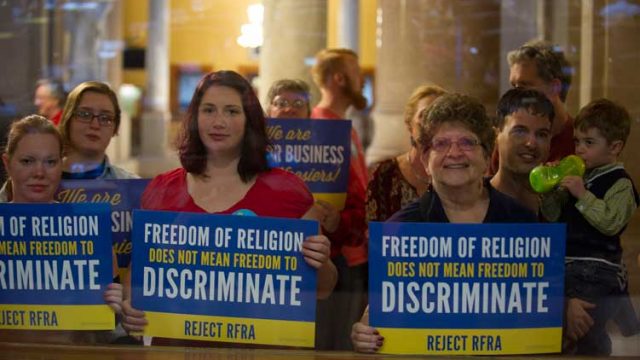In Defense Of Indiana's Religious Freedom Restoration Act

There is a serious backlash brewing against the State of Indiana over the state’s recently-passed Religious Freedom Restoration Act, which some perceive as providing carte blanche to those who want to discriminate against gays. Celebrities and businesses are scrambling to announce boycotts of the state, and Governor Mike Pence’s support for the law seems to be foundering.
Except, there doesn’t seem to be any evidence at all of any sort of widespread discrimination against gays in Indiana. Or any real desire to implement widespread discrimination.
This hullabaloo is ridiculous for a couple of reasons.
First, the idea of boycotting a state because its leaders have the wrong politics is, while perfectly legal in a free society, is not in keeping with American notions about liberty. “The idea that that people should be punished with boycotts or losing their jobs over having wrong beliefs hobbles the flowering of tolerant classical liberal market cosmopolitanism,” Reason’s Brian Doherty wrote about the Duck Dynasty controversy. I think that applies here as well.
[mks_pullquote align=”right” width=”300″ size=”24″ bg_color=”#000000″ txt_color=”#ffffff”]I think some have lost sight of what the term “tolerance” means. It doesn’t mean enforcing popular points of view on the intransigent. Popular points of view don’t need protection. What is needful of legal protections are unpopular points of view.[/mks_pullquote]
These promises of mass boycotts smacks of mob justice to me, and that the proponents of the boycotts claim they’re pushing them in the spirit of social justice and tolerance is beyond laughable. What they are specifically protesting is a law which creates an atmosphere of legal protection for unpopular behaviors based on religious beliefs.
I think some have lost sight of what the term “tolerance” means. It doesn’t mean enforcing popular points of view on the intransigent. Popular points of view don’t need protection. What is needful of legal protections are unpopular points of view.
As the saying goes, we don’t need the 1st amendment to protect conversations about the weather. We need it to protect unpopular speech. That same thinking applies here.
Second, left-wing activists and their mouthpieces in the media have painted RFRA laws as little more than tools of oppression to be wielded by social conservatives, but that’s not true. The history of RFRA laws lays in legal protections for Native American spiritual beliefs and Sheikh haircuts.
That the RFRA might also protect a Christian baker from being compelled by the state to serve a homosexual wedding is neither here nor there. The 1st amendment prohibits laws “impeding the free exercise of religion.” That statement cannot mean what it says if the state is allowed to compel people to violate their conscience.
And why would gay rights activists want such a thing? Wouldn’t we be better off as a society if Americans chose to be accepting of homosexuality, instead of being forced to do so at the tip of the government’s spear?
Boycott businesses that choose to discriminate against gays, by all means. But don’t boycott a state for seeking to protect the ability of people to make unpopular decisions based on their conscience.




